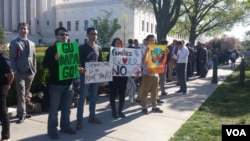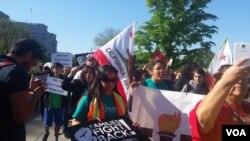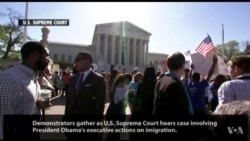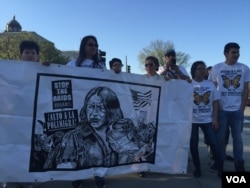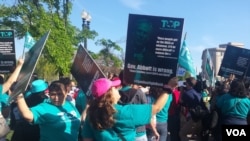Hundreds of demonstrators gathered Monday outside the U.S. Supreme Court chanting "Yes We Can," while inside the court justices considered a key phrase that could decide a landmark case debating the legality of President Barack Obama's executive order on immigration.
The court appeared to be divided over the meaning of the phrase "lawful presence" in Obama's 2014 executive order deferring deportations for some undocumented immigrants and whether it effectively created a new immigration law.
The justices’ decision will have far-reaching implications on executive actions by future presidential administrations and comes at a time when the nation’s flawed immigration system is a constant focus of election-year debate.
For Stephanie Uribe, a 16-year-old American citizen who waited outside the court with her undocumented parents, the decision will decide her family's future.
She said that before Obama introduced the programs "we had nothing, we had nothing to look forward to."
Uribe said her Chilean-born parents had spent half their lives in the United States and consider the country their home.
Stephanie's parents are among as many as four million undocumented immigrants who will be impacted by the court's decision.
Watch: Related TV report by Chris Simkins.
Obama's 2014 executive action expanded and created programs deferring deportation for the undocumented parents of legal U.S. citizens and residents and for undocumented immigrants who arrived in the country as children. The programs open up the opportunity for legal work permits, but do not give applicants a path to permanent residency or citizenship.
WATCH: Protesters in front of Supreme Court
The U.S. v. Texas lawsuit before the court argues the president exceeded his constitutional authority by effectively making new immigration laws through the programs.
Pending lawsuits
A decision in the Texas lawsuit will affect pending lawsuits in 25 other states opposing the president’s immigration actions.
Marley Arvelo, a Guatemalan-born 22-year-old who would be eligible for a work authorization under one of the president's executive actions, sat inside the court during the opening arguments. She said she had doubts after hearing the justices' questions.
"Maybe there are some judges that agree with us. But it seems half-half," she said.
Arvelo said a denial of the president's programs would change the lives of undocumented immigrants permanently.
"The doors will be closed for us in this country," she told VOA.
U.S. Solicitor General Donald Verrilli Jr., arguing the government's case, said the phrase "lawful presence" could be removed from the language ordering the programs without changing their impact.
Texas Solicitor General Scott Keller, arguing for the lawsuit, called the president's order "one of the largest immigration changes" in American history. Keller said the programs not only defer deportations, they change immigration status because they allow undocumented immigrants to obtain work authorizations.
Justice Anthony Kennedy appeared to agree when he said, "The president is setting policy and Congress is executing it. It seems upside down."
Constitutional authority
"It is exclusively the domain of the federal government to decide who gets to stay and who gets to go," said Angela Kelley, the executive director at the Center for American Progress Action Fund.
Kelley said Obama's executive actions build on decisions from past Democratic and Republican administrations to prioritize the deportation of undocumented immigrants with criminal histories rather than deporting undocumented children and immigrants with ties to the U.S.
Opponents say the Obama administration has not made a convincing constitutional argument for its actions.
"What the president is doing here is without historical precedent in the history of the country," said Dan Stein, president of the Federation for American Immigration Reform. "You have one political party that is saying, 'We're going to double down and exclude Congress, exclude the American people and not worry about what they've said about the rules.'"
Obama said his 2014 executive order directing immigration enforcement priorities was a result of Congress' failure to act on immigration reform.
A representative for Republicans in the House of Representatives argued Monday that only the U.S. Congress can create a pathway for immigrants in the U.S. to obtain lawful presence, and said the president's programs are far outside the federal government's enforcement discretion over immigration.
Earlier in the year, Congressional Republicans filed a brief with the Supreme Court supporting the lawsuits, writing "neither any immigration law now on the books, nor the Constitution empowers the executive to authorize, let alone facilitate, the prospective violation of those laws on a massive class-wide scale."
The absence of a ninth Supreme Court justice, after Justice Antonin Scalia died in February, could result in a split 4-4 decision on the Texas lawsuit. Only a majority decision of the Supreme Court can set a precedent, so the other 25 lawsuits would work their way through lower state courts for individual decisions.
Outside the Supreme Court on Monday, Stephanie Uribe's father, Peter, said the answer was inscribed on the front of the building.
"It says right there: equal justice under the law for everyone. This is what we hope will happen," he said.
The Supreme Court will announce the decision in June.




